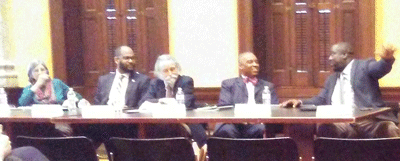The Baltimore City Office of Civil Rights and Wage Enforcement (BOCRWE) launched a new series of community dialogues entitled, “Can We Talk?” The inaugural event was held in the Curran Room at Baltimore City Hall on March 12, 2019. The first of the series was a presentation by Lawrence Brown, Ph.D., an assistant professor in Morgan State University’s School of Community Health and Policy, entitled, “Mapping Baltimore Apartheid in the Ongoing Quest for Civil Rights.”
Public information officer for BOCRWE, John Milton Wesley, the originator and coordinator of the community talk series, felt impelled to have Dr. Brown as the first presenter of the series because unfair housing practices have been such a prominent issue in Baltimore City.
“I felt like there was a need to have a one-on-one conversation with the communities across Baltimore,” Wesley said. “The idea was to create a series in which the people who support [Baltimore community] organizations could speak directly to the Office of Civil Rights.”
Free and open to the public, there was a decent-sized group of inquisitive community members present to take part in the introductory discussion.
Suzanne Haley, a racial equity trainer and community organizer, who attended the gathering says she was sought insight on the topic of housing discrimination after reading some of Brown’s articles.
“I’m just interested in peeling back the layers and changing the lens of the way we see what we see,” said Haley, an Ellicott City resident. “I’m curious about the devastation that I see in Baltimore, and so the presentation today helped me to get a clearer lens of what I’m really looking at.”
The destruction of black neighborhoods was created by policies— social algorithms that were enacted to determine what parts of the city received capital funding from the federal government.
As a result of which, black families were uprooted and pushed out. Plus the construction of major highways in the region displaced numerous black families and businesses, according to Dr. Brown whose research examines the impact of historical trauma on community health.
Another focus of Dr. Brown’s presentation was James Preston, the Mayor of Baltimore from 1911 to 1919, considered by many as one of the city’s most blatantly racist politicians for proposing and passing legislation that displaced black communities.
Dr. Brown also underlined a program called “Hope VI,” a plan originally drafted by the U.S. Department of Housing and Urban Development in 1992 under the Bill Clinton Administration. This piece of legislation was designed to revitalize the worst public housing projects into “mixed-income developments” in the nation’s major cities, but instead resulted in the displacement of countless black families and establishments, furthering a process known as gentrification.
The word “apartheid” was used repeatedly throughout his presentation to denote the deleterious effects that housing discrimination has had on Baltimore’s black population. He also spoke to the audience about racial bias in the mainstream media, pointing out documented headlines from past Baltimore Sun articles with phrases like “Negro Invasion,” “Infiltration of the Negro,” and “Emergency War Fund” whenever black people moved into traditionally white neighborhoods.
Moreover, Brown cited research finding that more of Baltimore City’s budget is spent on the police force than other important areas like community redevelopment, arts, education, housing, roads and public transportation.
To conclude his in-depth lecture, Dr. Brown presented what he feels is a feasible solution for the number of problems he highlighted, which was a $3 billion Racial Impact Bond— somewhat of a reparatory budget, which calls for more funds to be allotted to vital areas that will help to rebuild black communities adversely affected by gentrification and other inequitable housing policies.
During the panel discussion after Dr. Brown’s presentation, the topics of fair housing; infrastructural systems used to rebuild underprivileged communities; solutions to gentrification; challenging local government and policy makers were discussed.
The “Can We Talk?” series will be held at various locations across the city in the months ahead. The discussions will explore a variety of subjects important to the citizens of Baltimore and issues impacted by the work of the Office of Civil Rights.
Upon leaving the podium, Dr. Brown encapsulated his presentation by urging community members and leaders to take a firm stand against the deplorable inequities that have had such a grave impact on the city.
